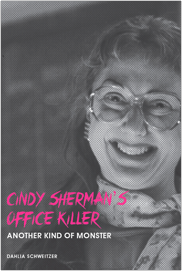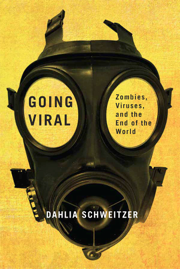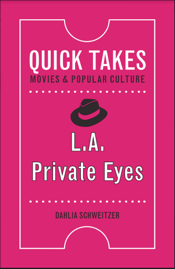
About Dahlia
DAHLIA SCHWEITZER is a pop culture critic, writer, and professor. Described by Vogue as “sexy, rebellious, and cool,” Schweitzer writes about film, television, music, gender, identity, and everything in between. She studied at Wesleyan University, lived and worked in New York City and Berlin, and completed her MA and PhD at the Art Center College of Design and UCLA. She is currently chair of the Film and Media department at the Fashion Institute of Technology in New York City.
In addition to her books, Dahlia has essays in publications including Cinema Journal, Journal of Popular Film and Television, Hyperallergic, Jump Cut, Quarterly Review of Film and Video, and The Journal of Popular Culture. She has also released several albums of electronic music, including Plastique and Original Pickup.

Professor
As a professor of film and media studies, Dahlia exposes her students to a variety of theoretical approaches and cinematic techniques, asking them to approach both with analytical inquisitiveness. Her aim is to pass her own curiosity on to her students, encouraging them to think across their classes and experiences to create intellectual connections between course materials and the world in which they live. She strives to remind her students that the loudest voice is not necessarily correct, and in so doing, helps them find their own.

Media Critic
Declared “one of the world’s leading analysts of popular culture” by renowned author Toby Miller, Dahlia writes about film, television, music, gender, identity, and everything in between. Her work can be found across mainstream, academic, and emergent channels in both long and short form. Repeatedly drawn to popular culture, Dahlia loves to analyze and unpack cultural artifacts in order to explore how they reflect social and historical issues, as well as looking at how they reinforce or interrogate common cultural assumptions.

Author
Dahlia has written numerous books exploring aspects of film and television. Regardless of the topic—serial killers, private detectives, or even zombies—all of her writing engages directly with questions of self versus other, private versus public space, examining depictions of gender, identity, and race. She traces how these depictions evolve and examines what they mean about our changing world. In her latest project, Dahlia explores the ways haunted homes have become a venue for dramatizing anxieties about family, gender, race, and economic collapse.
Blog
The Not-So-Magical Secret to Making Time to Write
In a perfect world, I wake up in the morning and make some tea, walk the dog, and then sit down in front of my computer to write. In a perfect world, I have all day to myself to read and write and think and create. In a perfect world, my email box is primarily empty, with only a smattering of messages intermittently throughout the day. In a perfect world, there is no traffic. Actually, in a perfect world, there is no commute at all. In a perfect world, there are no students, and definitely no...
Kurt Cobain Twenty Years Later: Moments of Silence
My memories of Kurt Cobain are complicated. I remember being shocked by his death, thinking, in my high school naivete, that rock stars live forever, forgetting that "forever" is long after the abandonment of this mortal coil. I also knew that if I was shocked, many others would be too, and I immediately rushed to read a quick speech over the high school public address system. I must have written it in advance, because I can't imagine I would do that kind of thing off-the-cuff, but there was...
Kurt Cobain Twenty Years Later: After the Nevermind
A guest post from Julie in Baltimore: Twenty years ago tomorrow, I learned of the death of Kurt Cobain. I’m ashamed to say I don’t remember how I learned about it exactly, whether it was a news flash on broadcast TV, or MTV’s day-long elegy, or songs played in tribute on the radio. But I remember how I felt. I remember being home during spring break of my junior year at college and parking myself in front of the TV in disbelief, and grief, and anger. I remember my parents recognizing that...




